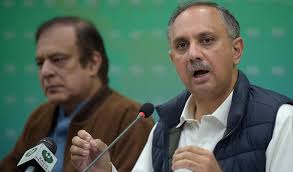
In a surprising turn of events, Pakistan Tehreek-e-Insaf (PTI), the political party led by the incarcerated former Prime Minister Imran Khan, has put forth Omar Ayub as its candidate for the position of Prime Minister. This move signals a significant shift in the country’s political landscape, as the grandson of ex-President Ayub Khan steps into the forefront of national leadership contention.
Omar Ayub, hailing from the lineage of Pakistan’s revered leader Field Marshal Ayub Khan, ventured into politics by joining the Pakistan Muslim League (Q) ahead of the 2002 general elections. His debut in the National Assembly during those elections marked the commencement of a dynamic political career. Serving in Shaukat Aziz’s cabinet as the State Minister for Finance, Ayub spearheaded various projects aimed at infrastructural development, particularly in his constituency of Haripur.
Despite electoral setbacks, Ayub’s resilience in the political arena remained evident. He later aligned himself with Imran Khan’s PTI in 2018, successfully securing re-election to the National Assembly from Haripur. Ayub’s tenure in the federal cabinet under Prime Minister Imran Khan further solidified his stature within the party.
The nomination of Omar Ayub as PTI’s candidate for Prime Minister comes amidst a backdrop of intense political maneuvering. With Imran Khan currently incarcerated, the party seeks to maintain its hold on power through a strategic choice in leadership. Ayub’s familial legacy, coupled with his political acumen and administrative experience, positions him as a formidable contender for the premiership.
Meanwhile, the political landscape remains tumultuous, with independent candidates supported by Imran Khan securing a significant number of seats in recent elections. This development sets the stage for a potentially fractured political scenario, as various factions vie for power and influence.
In contrast, the Pakistan Muslim League-Nawaz (PML-N) has nominated Shehbaz Sharif, a seasoned politician and former Prime Minister, as their candidate for Prime Minister. With backing from the influential military establishment, Sharif is anticipated to lead a coalition government, presenting a formidable challenge to PTI’s aspirations.
As Pakistan braces for a new chapter in its political trajectory, the nomination of Omar Ayub as PTI’s Prime Ministerial candidate adds a layer of intrigue to an already complex scenario. With rival factions vying for dominance and coalition dynamics at play, the path to leadership remains uncertain. However, Ayub’s emergence signals a continued evolution in Pakistan’s political landscape, where familial legacies intersect with contemporary challenges to shape the nation’s future.
Sources By Agencies


